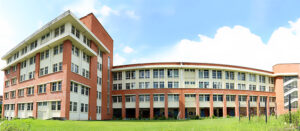Kathmandu Medical College (KMC) is a prestigious medical institution located in Kathmandu, Nepal, known for its commitment to excellence in medical education, research, and healthcare. Established in 1997, KMC has emerged as one of the leading medical colleges in Nepal, attracting students from Nepal and abroad.
The college is affiliated with Kathmandu University and recognized by the Nepal Medical Council (NMC) and the Medical Council of India (MCI), making its degrees widely recognized and respected internationally. KMC offers various undergraduate and postgraduate medical programs, including Bachelor of Medicine and Bachelor of Surgery (MBBS), as well as MD/MS and other specialized programs.

Kathmandu Medical College is equipped with modern facilities and infrastructure to support medical education and research. The campus includes state-of-the-art lecture halls, well-equipped laboratories, libraries stocked with medical literature, and simulation centers for practical training. The college also has affiliated hospitals where students gain hands-on clinical experience under the guidance of experienced faculty members and medical professionals.
One of the notable features of KMC is its dedicated faculty comprising highly qualified doctors, professors, and researchers who are committed to nurturing the next generation of healthcare professionals. The faculty members engage in research activities and contribute to advancements in medical science.
KMC places a strong emphasis on practical learning and clinical exposure to ensure that students develop the necessary skills and competencies required for medical practice. The college also encourages student participation in community outreach programs and medical camps to promote healthcare access in underserved areas.
Kathmandu Medical College stands as a center of academic excellence in medical education, providing a supportive learning environment and comprehensive training to aspiring doctors. With its focus on quality education, research, and compassionate healthcare, KMC continues to play a vital role in shaping the future of healthcare in Nepal and beyond.
Quick facts about Kathmandu Medical University:
| Fact |
Description |
| Establishment |
KMC was established in 1997 in Kathmandu, Nepal. |
| Program |
It offers a 5.5-year MBBS program, followed by a one-year internship. |
| Affiliation |
KMC is permanently affiliated to Kathmandu University. |
| Recognition |
Fully recognized by the Medical Council of Nepal, Sri Lankan Medical Council, and General Medical Council (UK). |
| Hospital |
Associated with Kathmandu Medical College & Teaching Hospital (KMCTH). |
| Location |
Located in the capital city of Nepal, Kathmandu. |
Affiliation and recognition of Kathmandu Medical University
- Nepal Medical Council (NMC):
- Kathmandu Medical College is recognized by the Nepal Medical Council, which is the regulatory body responsible for approving medical colleges and ensuring the quality of medical education in Nepal.
- Medical Council of India (MCI):
- KMC's MBBS degree is recognized by the Medical Council of India, allowing Indian students who graduate from KMC to pursue further studies or practice medicine in India after meeting MCI licensing requirements.
- World Health Organization (WHO):
- The medical programs offered by Kathmandu Medical College are listed in the World Directory of Medical Schools (WDMS) maintained by the World Health Organization. This recognition is important for international credibility and acceptance of KMC graduates.
- Educational Quality and Accreditation:
- Kathmandu Medical College is committed to maintaining high educational standards and undergoes periodic reviews and assessments by accrediting bodies to ensure compliance with national and international quality standards.
The affiliation and recognition of Kathmandu Medical College by these esteemed organizations and regulatory bodies underscore the college's commitment to excellence in medical education and healthcare. Graduates from KMC receive a degree that is widely accepted and respected globally, enabling them to pursue further studies, licensure, and career opportunities in various countries around the world.
Advantages of Study MBBS at Kathmandu Medical University:
Studying MBBS (Bachelor of Medicine, Bachelor of Surgery) at Kathmandu Medical College (KMC) in Nepal offers several advantages for aspiring medical students. Here are some key benefits of pursuing MBBS at KMC:
- High-Quality Education: KMC is affiliated with Kathmandu University and recognized by the Nepal Medical Council (NMC) and Medical Council of India (MCI). The college maintains high academic standards, providing a quality medical education that is respected internationally.
- International Recognition: The MBBS degree awarded by KMC is recognized by the World Health Organization (WHO) and listed in the World Directory of Medical Schools (WDMS). This recognition facilitates further studies and medical practice in various countries.
- Affordable Tuition Fees: Compared to many medical colleges in other countries, the tuition fees at KMC are relatively affordable. This makes studying MBBS in Nepal a cost-effective option for students seeking quality education.
- English-Medium Instruction: The MBBS program at KMC is conducted in English, making it accessible to international students. This eliminates language barriers and allows students to focus on their studies effectively.
- Experienced Faculty: KMC boasts a dedicated team of experienced faculty members who are experts in their respective fields. They provide comprehensive guidance and mentorship to students throughout their academic journey.
- Modern Infrastructure: The college is equipped with modern facilities, including well-equipped laboratories, libraries, simulation centers, and affiliated hospitals for clinical training. This ensures that students receive hands-on experience and practical training.
- Clinical Exposure: KMC offers ample opportunities for clinical exposure through rotations in affiliated hospitals and healthcare institutions. This practical training is essential for developing clinical skills and preparing students for professional practice.
- Cultural Experience: Studying at KMC allows international students to immerse themselves in the rich culture and heritage of Nepal. It's an opportunity to interact with diverse communities and gain a broader perspective on global healthcare.
- Global Career Opportunities: Graduates from KMC are well-prepared to pursue diverse career paths in medicine. The international recognition of the degree opens doors to employment opportunities and further specialization worldwide.
- Safe and Welcoming Environment: Nepal is known for its warm hospitality and safety for international students. KMC provides a supportive learning environment where students can thrive academically and personally.
Studying MBBS at Kathmandu Medical College offers a rewarding educational experience with excellent academic standards, practical training, international recognition, and cultural immersion. It equips students with the skills and knowledge needed to succeed in the field of medicine globally.
Why Choose Nepal For MBBS?
Studying MBBS in Nepal offers several advantages for aspiring medical students. Let’s explore some of the key benefits:
- Quality Education: Nepal has reputable medical universities that provide high-quality education. These institutions follow international standards and have experienced faculty members.
- Affordability: The tuition fees for MBBS in Nepal are affordable, making it an attractive option for students seeking quality education without excessive financial burden11.
- Global Recognition: Nepali medical degrees are recognized by organizations such as the World Health Organization (WHO) and the National Medical Council (NMC). Graduates can practice medicine worldwide.
- NMC-Approved Universities: Nepal has NMC-accredited medical universities, which is advantageous for Indian students. The curriculum is similar to that in India, making it easier to pass the NMC screening test.
- Cultural Immersion: Studying in Nepal provides a unique cultural experience. Students can explore Nepal’s rich heritage, traditions, and natural beauty.
- Clinical Exposure: Nepali medical colleges offer extensive clinical exposure through affiliated hospitals. This hands-on training enhances students’ practical skills.
- Multicultural Environment: Nepal’s diverse population ensures a multicultural learning environment, fostering cultural understanding and broadening perspectives.
Studying MBBS in Nepal provides numerous advantages, including high-quality education, affordability, global recognition, extensive clinical exposure, cultural immersion, and multicultural experiences.




